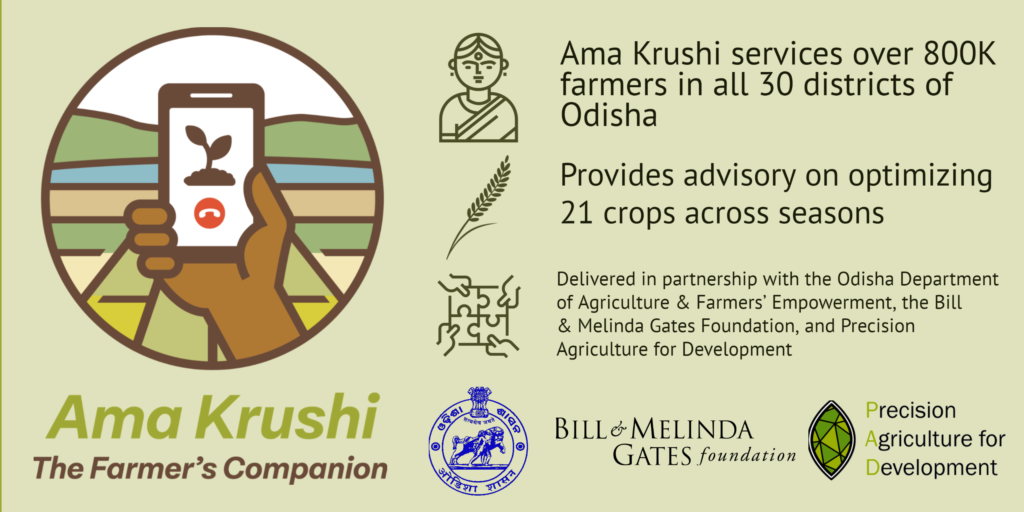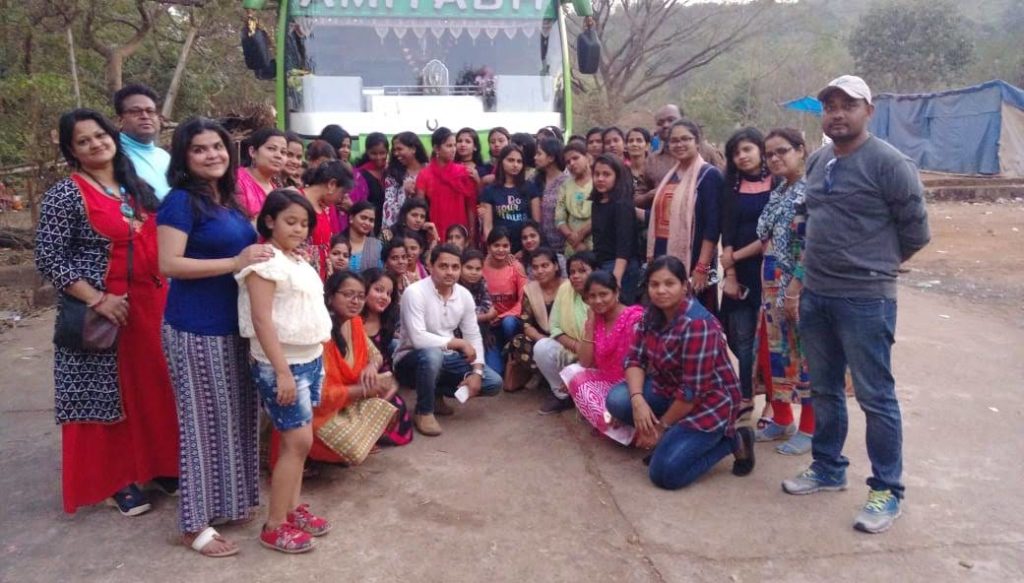Frontline delivery in the time of COVID: Ama Krushi in action
- July 21, 2020
- 11 minutes read
Otini Mpinganjira, Odisha State Lead, & Vineet Keshaw, Senior Implementation Associate, pay tribute to a remarkable team effort that has kept farmers informed in unprecedented times.
Precision Agriculture for Development’s Ama Krushi digital extension service was officially launched in 2018 with the ambitious target of reaching one million, predominantly poor, smallholder households in Odisha in just three years. Given the scale of the objective and the ambition of the delivery timeline, the culture of the Ama Krushi team is one that is accustomed to chasing down milestone achievements while adapting quickly to new challenges.
Generations of Odisha farmers have navigated challenges associated with drought and the cyclones that regularly rumble in off the Bay of Bengal. At the beginning of 2020, neither the Ama Krushi team nor the farmers we serve, could have anticipated the scale of the crisis associated with COVID-19, or the operational jiu-jitsu required of us to maintain – and grow – our digital extension service in the cross-hairs of the pandemic.

Two years along our delivery path, the two-way interactive voice response (IVR) system pioneered by Ama Krushi reaches over 800,000 farmers across all of Odisha’s districts. Our overarching task has always been clear: to deploy PAD’s iterative and human-centred approach to design, and to deliver actionable and impactful information to farmers via their mobile phones to secure and improve farmer livelihoods.
On a normal day (read: open office, no pandemic), a step into the programme office is welcomed with a buzz of activity akin to a lively bee colony: you hear the enthusiastic voices of approximately 100 call centre agents speaking to farmers handling a variety of tasks (onboarding new farmers, answering queries, coordinating remote training and remote surveying etc.). This buzz is contrasted by the soundproofed quiet of the content generation space with its pristine white walls and our team of agronomic experts going about their work responding to farmer queries or recording new messages.

Aah, the good old days! As is now commonplace across the world, the situation today is very different to “normal”. However, one shouldn’t be too nostalgic. In normal circumstances, the smallholder farmers we serve face a level of information poverty that perpetuates a cycle of hunger and inhibits economic opportunity. By limiting physical interactions and affecting supply chains, the current pandemic has the potential to exacerbate this information gap; further escalating the precariousness of smallholder livelihoods.
PAD and the Ama Krushi team in Odisha have worked tirelessly to ensure minimal disruption to our services. Safety first!. Our highest priority was to ensure the safety of the team and our farmers. While the office was still open we swiftly implemented best practices to optimize hygiene, introduced a regime of regular disinfection for shared and commonly regularly used surfaces, provided hand cleansing facilities in all workspaces, and adjusted sick leave policies.
As the effects of the pandemic worsened and it became obvious that lockdown measures were imminent, the team worked to define a set of critical activities, and identified the complementary technologies and protocols that would be required to keep the programme operational as staff began working from home. Critical services and activities were identified as follows:
- Farmer Onboarding: Continued profiling and onboarding would ensure that new farmers could continue to join the service. In the context of the lockdown, onboarding farmers became more urgent as many farmers lost all other sources of information in the aftermath of agro-dealers being shut, and agricultural extension workers becoming unavailable due to the lockdown. The deep-dive in Box 2 below details the journey to moving our call centre operations to remote working status. Between April and June 2020, Ama Krushi successfully onboarded just over 106,000 new farmers.
- Content Delivery: Notwithstanding the well-documented advantages of digital extension services (cost-effectiveness, scalability, hugely favorable benefit-cost ratios, etc), a key advantage of digital advisory services during the current crisis is that information can be delivered via mobile phone without risking the health of farmers or extension workers. Delivering content would ensure that farmers registered on the service would continue to receive their weekly advisory messages. By happenstance, lockdown measures were imposed at an important transition point as farmers moved from harvest and crop storage activities following the winter season (Rabi), to preparation activities ahead of the summer season (Kharif). In addition to our regular agronomic advisory, Ama Krushi was well-placed to ensure that farmers were able to receive information alerts related to the lockdown. Overall, between April and June 2020, the service sent over 5.6 million outbound messages on a variety of topics (e.g. disease and pest management, harvest management, lockdown related advisories etc.).
- For example, on 15th & 16th April, Ama Krushi issued an advisory to ensure that farmers were aware that they could still take their produce to market (see Box 1, below)
- Similarly we distributed content related to the onset of the Kharif planting season, informing farmers that they could initiate cultivation.
BOX 1: Examples of messages sent during lockdown
“Namaskar. Welcome to Ama Krushi, the free Agriculture Information service of the Department of Agriculture, Government of Odisha. Some special information for farmers: Farmers who are harvesting a variety of vegetables this Rabi season can take their produce to the nearest agricultural market for sale. There is no barrier to transporting your products. Contact your nearest agricultural officer or horticultural officer for this.”
“Namaskar. Welcome to Ama Krushi […] Some special information for farmers: The current Kharif season has begun. At this time, farmers can cultivate their own land despite the coronavirus shutdown. You can use your own or rent agricultural machinery. Contact your nearest agricultural officer or horticultural officer for more information.”
- Farmer Helpdesk: We also needed to ensure the continued operation of our automated inbound service; i.e. to allow registered farmers to continue to call in and record questions 24/7. Our Live Call Centre (LCC) service, where farmers speak directly to an agent, saw a three hour extension in operating hours to assist farmers during a period of heightened need. Our partners at the Department of Agriculture & Farmers’ Empowerment (DAFE) actively promoted the LCC service through television and print media resulting in a 500% increase in traffic. For all inbound calls, our team applies tags which allow us to categorise the nature of a question and to link it to answer in our answer library. For lockdown operations, we introduced new tags to track issues related to the lockdown, as well as to ease the summarizing of data pertaining to the preparation of daily reports for DAFE and other policy makers. The team took the extra step of forwarding particularly complex queries to district nodal officers with the intention that they follow up with complementary advice in person on the ground. This was achieved in collaboration with members of the Analytics for Decision-making and Agriculture Policy Transformation (ADAPT) team; a sister project also working with DAFE. Between April and June 2020, the LCC received just over 24,000 calls primarily related to government schemes, market registration as well as pest and disease management.
- Research & Development: To more systematically understand the evolution of the pandemic and its local impacts, our research teams quickly developed a survey tool.
BOX 2: Moving a 100 person call centre to remote work
By design, the Odisha programme uses a call centre model to onboard (profile) farmers. The model has various advantages for data quality and resource effectiveness. In solving the problem of building remote call centre functionality, we borrowed heavily from tools under development in the technology pipeline. Over a 2 week period, we then worked to re-purpose them for the needed functionality. The main challenge was how to enable our agents to use a combination of feature-phones and smartphones to make and receive calls while maintaining some of the quality assurance protocols that we had in place. The other challenge was logistical; i.e. ensuring that agents had access to mobile phones and SIM cards, that we had an efficient and secure way of delivering farmer numbers and that we could train them on use of the new systems.
To test our solution, the team launched remote profiling at 25% of our operating capacity. At the same time, we introduced a back-check model to substitute our previous monitoring system. Our technical team made the requisite changes to ensure secure access to farmer’s details. The new home-based profiling system was not only customized to enable our staff to access it from their mobile phones, it also integrated a range of functions appropriated from the dialer system we use when working from the office, including the following additional functions:
- Sample selection: It automatically provides farmer details to survey agents.
- Call status: Survey agents are able to submit call status which helps to maintain the call log and the overall monitoring system.
- Incoming call: One of the biggest issues survey agents faced was not being able to record the details of farmers who call back. To assist with this challenge, we implemented changes to enable survey agents to profile and note the number of incoming calls.
- Survey agents activity: Surveyors can access their performance indicators, i.e. calls made, the number of farmers profiled over a month, a week and on that particular day.
- Training: To train our survey agents, we implemented a remote training solution utilizing video conferencing.
Given the scale of the challenges arrayed before us, and the emerging needs of our famers, we have of course experienced many challenges, including technology not functioning as intended to connectivity issues affecting output. We also continue to be engaged in a battle to shift our collective mindsets to maintain productivity as we work from home, and while we balance domestic duties and distractions.
As the Kharif season moves into gear and as we come to terms with the long-term nature of the pandemic, we have started to prepare more proactively for the future.
Normalisation is the key word here. Through downshifting, we are faced with the challenge of empowering execution staff to own – as they did before – the majority of day-to-day call centre functions. This will include training them on the tools that our project managers have been using to manage our remote call centre functionality as well as providing them with checklists and avenues for assistance. This will allow us to dedicate project management resources and capabilities to reintroducing deprioritised, but nevertheless important, components of the programme such as manual feedback surveys and remote farmer training.

We are immensely proud of the work of the Ama Krushi team. Through flexible application of technology, a get-stuff-done mentality, and the enduring spirit of this team, our service to farmers never stopped… Not even for a day.
From the survey agents and agronomists who showed their willingness to work from their home, despite many having to do so in circumstances that are far from ideal, to the supervising team who stayed on top of teething issues and provided valuable input when necessary. This has been a huge collective effort . An unavoidable cost of work-from-home arrangements is that not all jobs can be done from home. Similarly, some roles may become more peripheral as priorities are realigned. It has been heartwarming to note the care the team has extended toward one another. One example is the contributions drive organised towards a fund for our security guard, who due to mobility restrictions, was unable to return home to his family for several weeks.
As a team – spurred by a crisis or two – we have learnt the value of purposeful and early communication as a tool for establishing a common baseline understanding for everyone to work from, and the need for maintaining connections across the wider team. We have reaffirmed our shared mission to empower smallholder farmers, and despite not being together, we have worked together to keep the programme running.
We thank our partners at the Department of Agriculture and Farmers’ Empowerment for accommodating and supporting our work from home initiatives throughout this period.
Ama Krushi is on track to empower one million smallholder farming families ahead of schedule. None of us could have imagined the conditions in which we strive to reach that milestone, and pilot new projects targeting livestock and women farmers, as we continue to iterate and add more value to the service.

Stay Updated with Our Newsletter

Make an Impact Today


